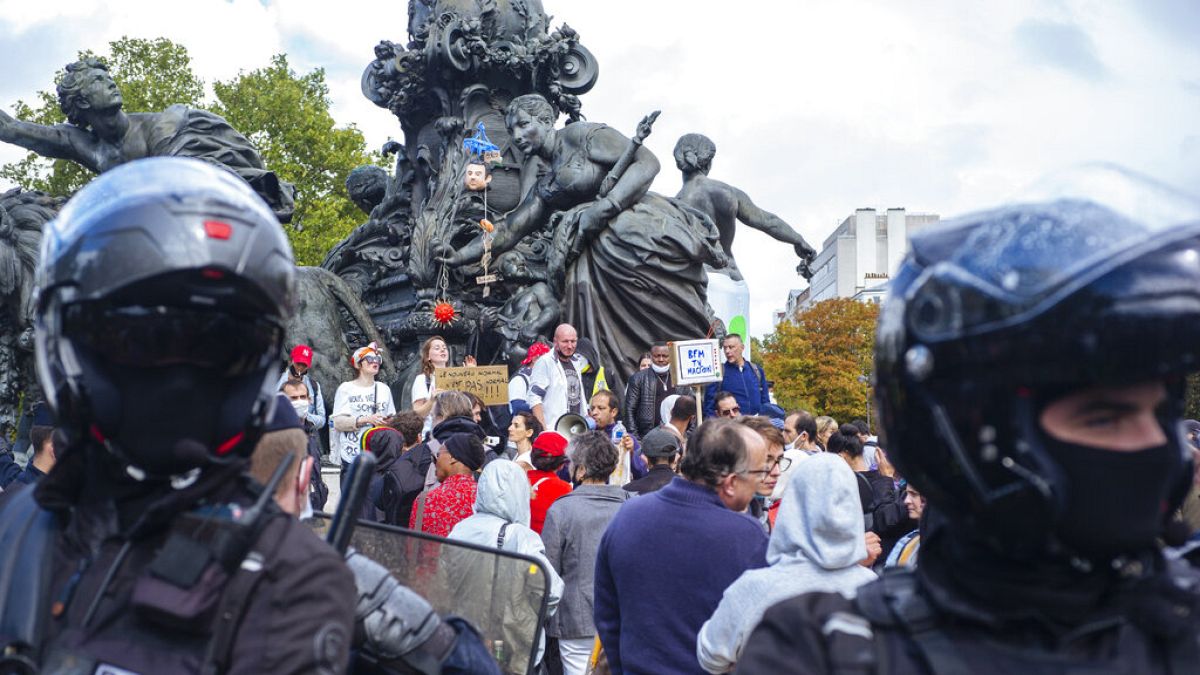Man or woman? Conspiracy theorist or libertarian? Right or left wing? Here is the typical profile of people refusing to wear a mask in France.
You would think that recent surges of COVID-19 cases in France would scare almost anyone into following what has become the new normal in public and closed spaces across Europe: wearing a mask.
And yet, some hardline French still won't put one on. Indeed, on August 29, hundreds rallied in Paris to march against the newly-introduced rule.
Since then, the French left-wing think tank Fondation Jean Jaurès has established the typical characteristics of people refusing to wear a face mask after interviewing more than 1,000 "anti-maskers" on Facebook.
On what grounds does one refuse to wear a mask? Here's what we can learn for the survey.
The masks are useless, if not dangerous
The author of the survey, Antoine Bristielle, highlights that, among the arguments for not wearing a mask, a handful seem to have reached a consensus in the "anti-mask" majority.
These "anti-maskers" are mostly active on social media, in dozens of Facebook groups that gather up thousands of people.
The belief is that the masks themselves are ineffective and can even stop you from breathing properly.
Florence, a 52-year-old theatre director is one of them. "No reliable study has proven the mask is of any use," she told Euronews.
Amongst the many topics that are discussed within these groups, wearing the mask at school is very popular. "Children are being silently traumatised," Florence claimed.
"It is utterly useless given the way people are wearing it," argued 51-year-old restaurant owner Karl. "Besides, this issue is dividing the people in an absolutely absurd way," he told Euronews while blaming the government's "sort of pseudo-protective, divine authority" for producing "fear and hate".
The respondents also tend to believe there is no pandemic and consider the mask to be an enslavement tool for the population.
"The epidemic has been gone for months," Florence said. "We are just collectively trained to submission," she maintains.
Mistrust and conspiracy
Why do people refuse to wear a mask on these grounds?
The study points out the link between the theories and the mistrust of government and institutions by the population.
While 34% of the overall population trust French President Emmanuel Macron, only 2% of the respondents from the anti-mask groups do.
The survey shows that traditionally trusted institution like hospitals is not as trusted by the "anti-maskers" than by the French population.
It also appears that they are more prone to conspiracy theories: for instance, they were 90% to believe that the French Minister for Health is in league with pharmaceutical industries to hide the real toxicity of vaccines (43% for the overall population).
Interestingly, "anti-maskers" favour the Internet as a means to be informed (78%) while almost half of the overall population choose television (47%).
Social and political characteristics
The upper socio-professional categories — white and grey collar workers — seem to be overrepresented in the anti-mask groups.
"The support of libertarianism increases alongside the level of education and salary," Bristielle noted.
"Those who swing into action because of their institutional mistrust are not necessarily representative of the average individuals that share the mistrust" qualified the author, noting that the study focused on the former.
He told Euronews, however, that "the people who rally online tend to be the same as the people marching in the public space".
"Facebook has become a mobilisation tool, he said. The rallying either stays on social media, or serves as a springboard." Bristielle points out this is what happened for the yellow vest movement — 22% of the "anti-maskers" got involved in the movement and 57% supported it without participating.
As for where the anti-maskers stand on the political spectrum, they appear to slightly tilt to the ring wing — even though it is quite balanced.
There is no surprise here according to Bristielle who stressed that "libertarian views often belong to the right when it comes to economic policies and to the left when it comes to social issues".
